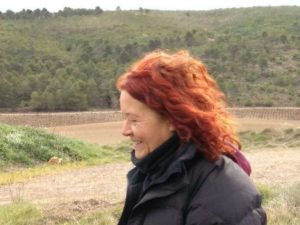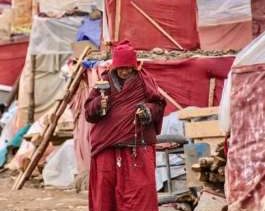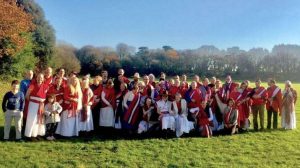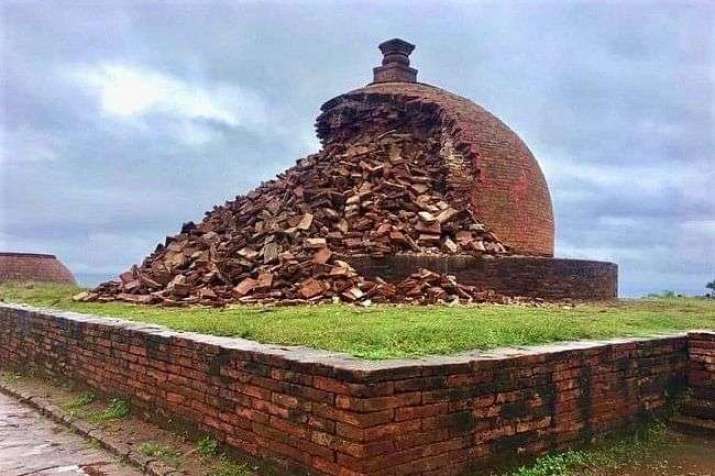
Activists and Buddhist organizations in India’s southeastern coastal state of Andhra Pradesh have criticized plans by the state government to construct a guesthouse and accommodation compound for VIPs in close proximity to the ancient Thotlakonda Buddhist complex. Critics of the development say the project risks damaging the 2,000-year-old heritage site and could also pose a threat to other, as-yet-unexplored archeological remains from the Buddhist era.
The Thotlakonda Buddhist complex, spread over some 48 hectares on a low hill overlooking the ocean some 15 kilometers from the executive state capital Visakhapatnam, is believed to have flourished between the second century BCE and the second century CE, declining by the end of the third century. Thotlakonda emerged alongside other nearby Buddhist complexes, such as Bavikonda and Pavurallakonda, and fell within the influence of the ancient region of Kalinga, which was instrumental in disseminating Buddhism to Sri Lanka and Southeast Asia. Buddhist monks from across Asia are believed to have traveled to study and practice at Thotlakonda.
Andhra Pradesh’s minister for tourism, Muttamsetti Srinivasa Rao, told local media that the proposed government guesthouse, which would occupy a 12-hectare site on Greyhounds Hill to the north of Visakhapatnam, would not pose a threat to Thotlakonda or the nearby Bavikonda archaeological site. Speaking on Monday, Srinivasa Rao said that the planned compound was one kilometer from Thotlakonda, and insisted that the project was not on a heritage site.
Bavikonda monastery is located on a separate hill, some two kilometers from Thotlakonda
“Our government is committed to the protection of heritage sites. The proposed guesthouse is more than one kilometer away from the protected site,” said Srinivasa Rao. “We are planning Vipassana meditation and Buddhist activity at the protected site to draw tourists from the Buddhist countries. We had restored a Maha-stupa at Thotlakonda . . . which shows our commitment to its protection.” (The Hindu)
Named in the Telugu language, Thotlakonda is derived from the rock-cut water cisterns found in the local bedrock. Since the discovery of the site in 1976, which has since been declared a protected monument by the state government, notable excavations at the site include the reconstructed Maha-stupa—which partially collapsed last year during heavy rains—16 votive stupas, a stone pillared congregation hall, three circular prayer halls, 10 viharas, a kitchen complex, and a refectory. Silver roman coins and other evidence of international commerce have also been found at the site.
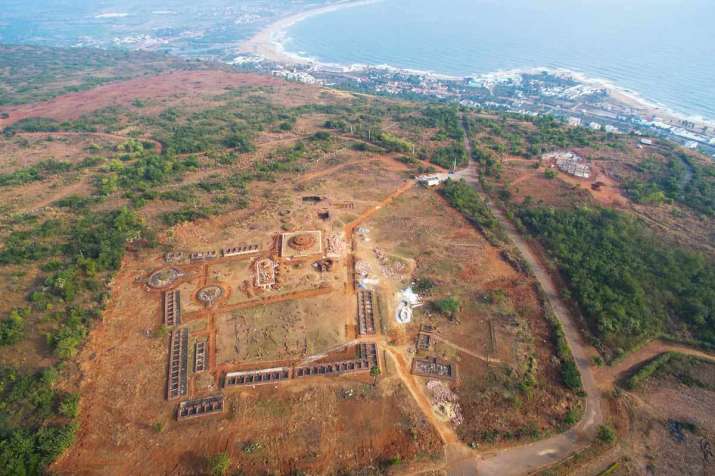
While the government denies any possibility that proposed development site has any historical significance, activists and Buddhist organizations in the state have vociferously opposed any development of the area, pointing to the high potential of rich archeological evidence from the early Buddhist era lying undiscovered in the partially explored area.
According to The Hindu newspaper, former government official and social activist E. A. S. Sarma expressed anguish over the government project, and was cited as saying said that all the land fell within a survey area protected by the Ancient and Historical Monuments, Archaeological Sites and Remains Act of 1960. In addition to any proposed development being in violation of the act, Sarma observed that the survey area is rich in archaeological evidence and remains dating back to the third century BCE, much of which is still unexplored.
The importance of protecting the area because of its archaeological significance was also emphasized by American anthropologist Lars Fogelin, who has previously conducted surveys around the Thotlakonda site. Fogelin noted that judicial intervention would be sought if the government ignored appeals not to proceed with the development project.
In his book Archaeology of Early Buddhism (2006), Fogelin states that that his team “surveyed 7.3 square kilometers and identified 328 archaeological features, including walls, terraces, reservoirs, and a stupa (a Buddhist ritual structure)” during fieldwork carried out between 2000 and 2002. (The News Minute)
Fogelin’s research also touches upon the “relationship between Buddhist monks and laypeople during the Early Historic Period,” and also involved the study of “smaller, non-monastic archaeological remains” in the area around Thotlakonda. His book mentions social interactions between monastics and local residents, as well as “a complex mortuary landscape combining the memorials of both monks and nuns scattered across the nearby hills.” (The News Minute)
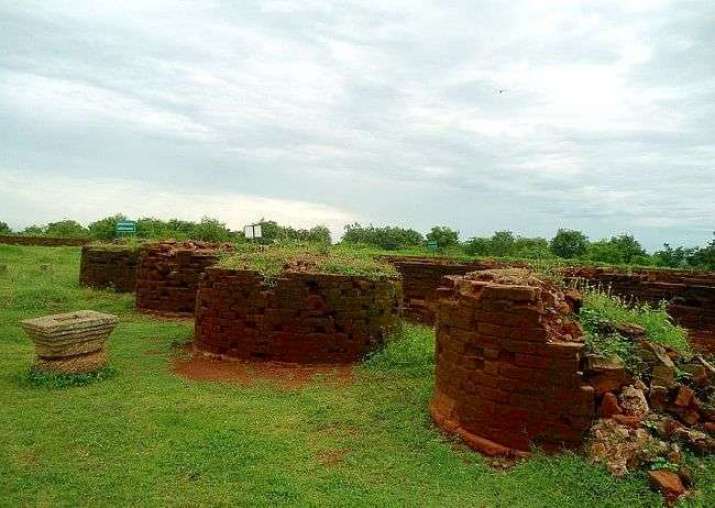
Kothapalli Venkataramana, convener of the Buddhist Monument Protection Committee, alleged that land records related to the surveyed area around Thotlakonda had been altered over the years to modify the original 1,200-hectare protected area. Venkataramana stated that at least 240 hectares of historical significance were directly related to Thotlakonda and that the proposed government guesthouse fell within that area.
“Over the past few years, many revenue officers disturbed [the protected survey area] and brought it down to 120 acres [48 hectares],” Venkataramana said. “A proper survey on Buddhist structures was not conducted. There’s actually at least 600 acres [240 hectares] of land where Buddhist structures were found. Currently, they are considering only a few structures, but there are others further away, like bathing structures used back then, which are not being considered [by the government].” (The News Minute)
See more
Andhra’s unexplored Buddhist sites being endangered for a govt guest house? (The News Minute)
Andhra Tourism Minister says guest house will pose no threat to Buddhist site (The New Indian Express)
No construction near old Buddhist site, says EAS Sarma (The New Indian Express)
Ramakrishna Raju urges Centre to protect Thotlakonda heritage site (The Hindu)
YSR Congress, TDP trade barbs over construction near Thotlakonda (The Hindu)
Andhra Pradesh Government’s decision cannot be stopped for long: Minister M Srinivasa Rao (The Hans Ind)






